When employees rate their managers...
... this leads to à some less-than-glamorous results. Management consultancy BPI surveyed é employees in 10 countries. The results show that French managers are the least appreciated. The results? Employeeséless attachedéto directives and higher expectations in terms of recognition.
.French bosses, unlovedés
| Generally speaking, what is your opinion of your company's managers? Source: BPI / BVA | ||
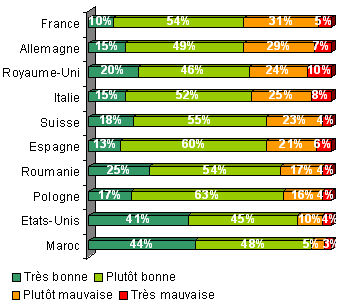 |
While at least two-thirds of employeesérate their managers favorably, sharp disparities appear according to country.While in the USA, very favorable responses reach 41%, they are only 10% in France, the lowest figure.
However, only 5% of French employeeséà rate their bosses veryéfavorably, whereas this figure reaches 10% in the UK.
According to management consultancy BPI, these results show "characteristics specific to European countries whereéoften a distance/détrust is installedéin companies." In contrast to the American model, where the distance between managers and executives is much smaller.
Managers préférés to executives
| Comparison of très good opinions of executives and managers Source: BPI / BVA | ||
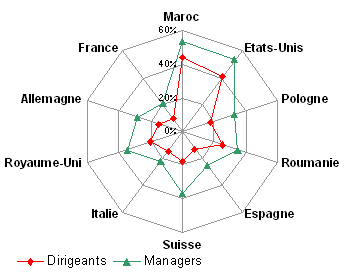 |
When we distinguish between proximity managersé and executives, the former reécolte a significantly higher rate of favorable opinion élevé, regardless of country.
We can thus see that the curve for managers' "veryègood opinions" envelops that of executives.The opposite observation holds for veryèbad opinions. On average, très good opinions increase by 12%.
The most élevées amplitudes are observed in the United Kingdom and Romania, in contrast to the États-Unis and Italy (these two countries nevertheless having very éloignés results).
Replacing your supérior: yes but...
| Could you do the same job as your direct hierarchical superior? Source: BPI / BVA | ||
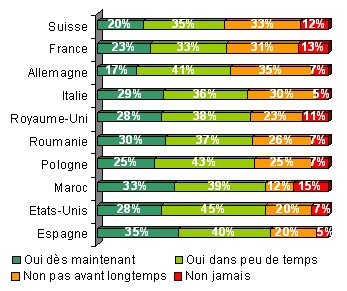 |
||
|
Morocco : DK = 1
|
More than halfé of employees think they can do the job of their superior, immediately or à in the short term. The French, however, are among the least confident, with only 55% of responses positive.
A result that is paradoxically explained by the poor opinion they have of their manager. BPI foundé that"the more managers are consideredécompetent, the more employees feel they can replace them", and vice versa. In countries where the managerés competence is little recognized, the level of expectation towards superiors is more éraisedé. This would justify employeesédoubting their abilityé à to be able to réalise its tâches.
Désobéissance, a common phénomène
| Do you ever not follow the instructions of your direct hierarchical superior? Source: BPI / BVA | ||
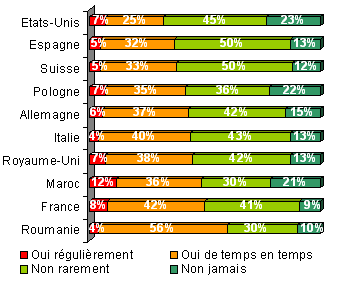 |
||
|
Morocco : DK = 1% |
Autonomy or lack of discipline? It's clear that, whatever the country concerned, employees don't hesitate to à sobéir to the directives of their hierarchical superiors. While only 32% of Americans do so, 50% of French employeeséadmit to not following orders, either regularly or occasionally. A figure that rises à 60% in Romania.
It also appearséthat a correlation exists between the degreeéof obéissance and the relationship managers and employeeséhave (depending on whether it's professional or friendly)."When the professional relationship dominates, employeeséfrequently tend to à 'only à their tête'", we note at BPI. À Conversely, when the relationship takes a friendly turn, this limits déviant behavior.
The qualitieséof managers
| Relation between the qualities "Friendly" and "Authoritative" Source: BPI / BVA | ||
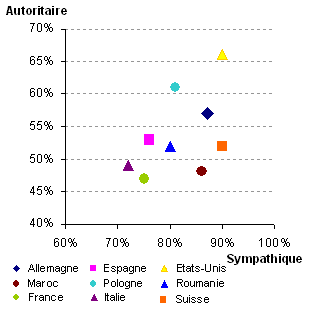 |
The qualitieséof managers highlighted by their éteams are their competence (84%), their likeability (83%) and their sense of responsibilityés (80%). France is less positive on the first two qualities (only 75% positive on these two points). On the other hand French managersçare described as responsible by 82% of employeesés.
The relationship between the attributes "likeable" and "authoritarian" shows a surprising level of corrélation. Indeed, the least authoritarian countries, such as France and Italy, have a low level of likeability. In contrast, the ÉUnited States achieves the highest scores élevées on both aspects.
According to BPI, these results can be explained by differing éciation from the authorityé. "Authorityé is thus highly valued in the États-Unis but understood as leadership and capacityé à to take décisions. In France, we readily confuse autorité with autoritarisme, the willé to sanction."
Employee expectationsés
| Today, what do you most expecté from your direct hierarchical superior? Source: BPI / BVA | ||
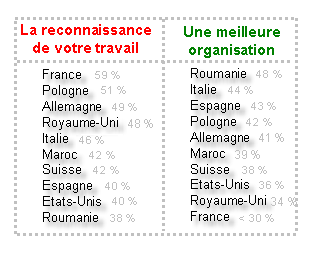 |
Work recognition is a priorityé for employees surveyedés: 45% cite it. According to BPI, this is an underlying trend in the world of work: "recognition has become a priorityé in professional worlds that demand ever greater involvement and réactivité." In France, this need is expressed the mosté, citedé in 59% of cases.
The second expectation concerns the organization of work in équipe. These two demands évolve in opposite directions depending on the country, and allow us to dégage countries à tending towards individualism (the UK and France in particular). Personal professional development then takes precedence over the collective aspect.
Source JdN



